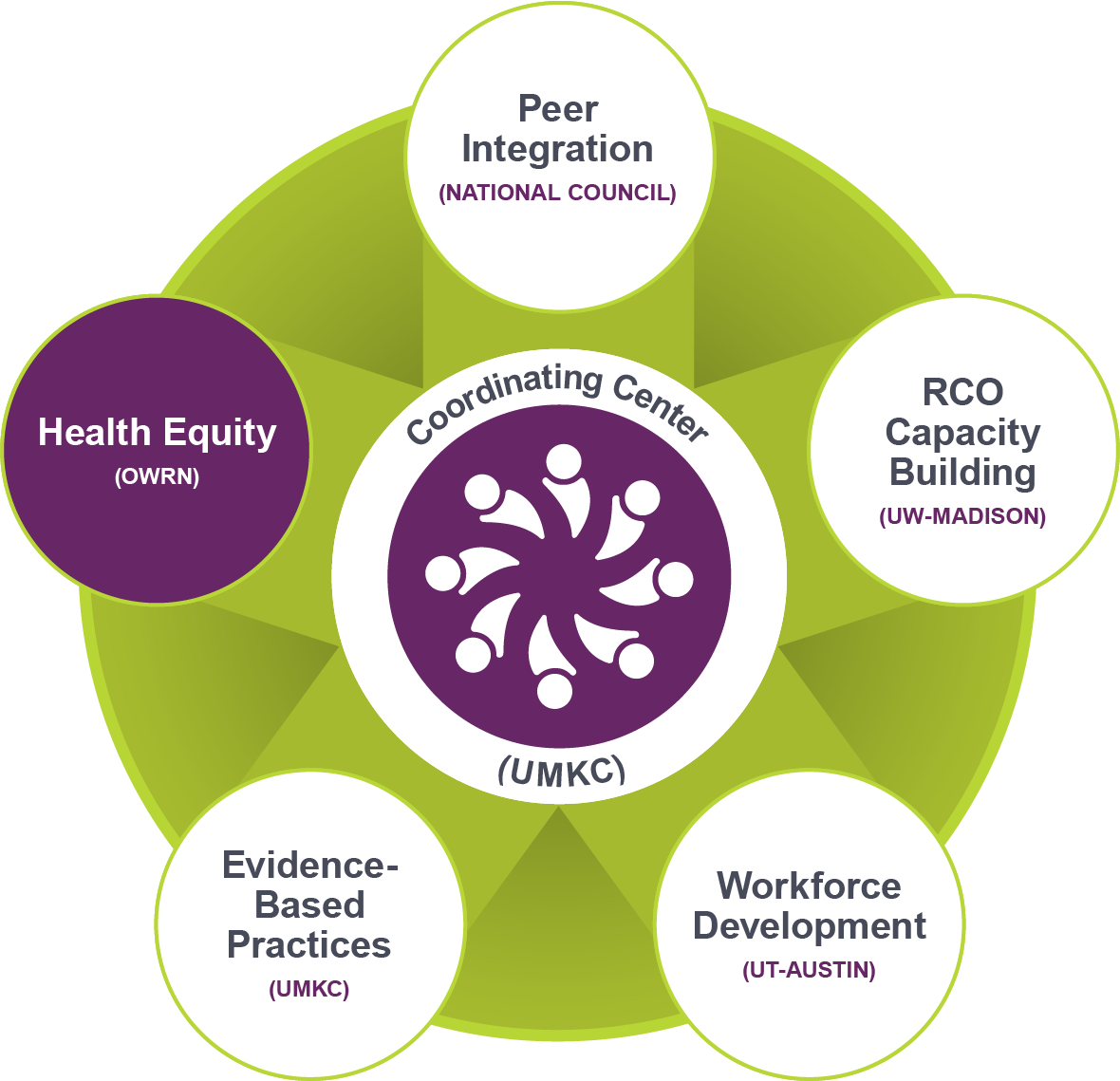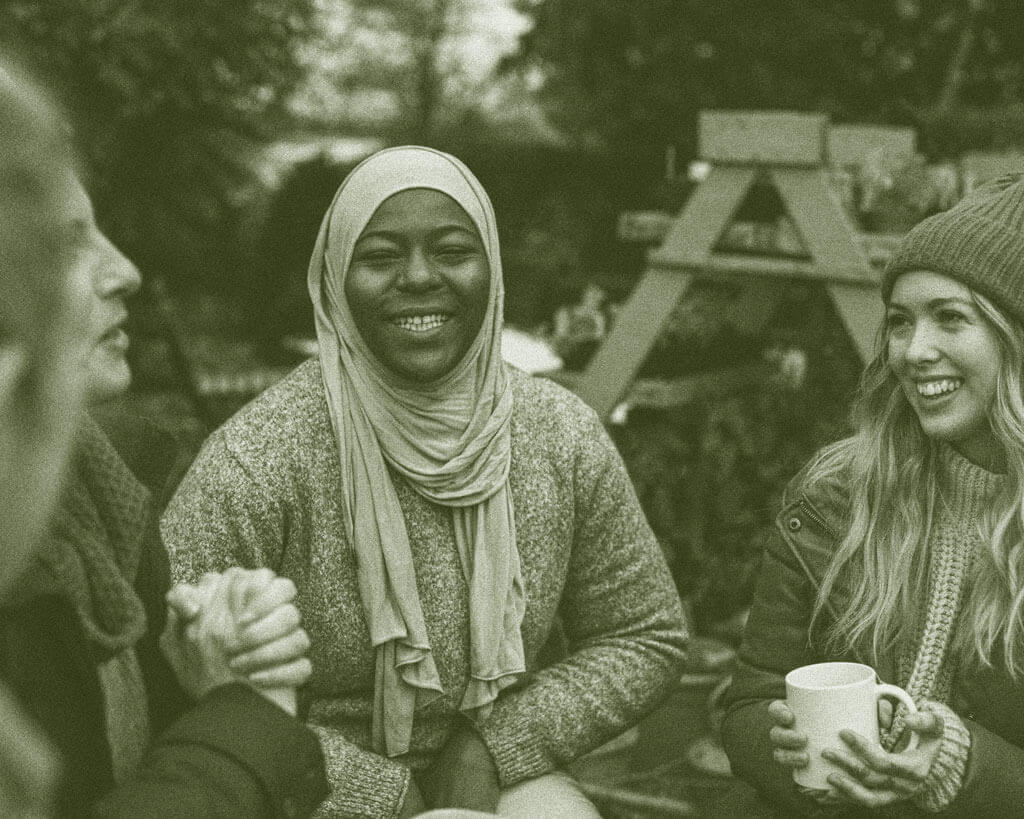Imagine a world where diversity, equity, and inclusion are not just celebrated but—a world where the peer workforce and recovery community organizations are deeply understood, valued, and appropriately integrated across systems. Health equity is a priority for the PR CoE’s work internally and externally. Internally, the PR CoE seeks to promote inclusivity and equity in its workshops and other offerings. To this end, we are beginning to collect demographic information from participants and monitor the geographic distribution of recipients of our services. We also seek to diversify our roster of subject matter experts and consultants and to host community listening sessions in underserved areas of the U.S. Externally, we plan to develop a series of events, tools, and resources focused on promoting diversity, equity, and inclusion of the peer workforce and in the delivery of peer services.
This focus area is integral to the work of the PR CoE as it ties directly into our mission, vision, and values. We recognize that our work will have limited impact if it does not center the diverse voices of individuals with lived experience in recovery, seek to include them in decision-making processes, and work consistently towards greater equity in peer services. Examples of work we have done related to equity include our work to create spaces for peer workers from the deaf and hard-of-hearing community as well as our community listening sessions with the Puerto Rican community. Health Equity is more than just a focus area; it's a beacon of hope! We are leaders and experts who are committed to advancing health equity. We are also from diverse backgrounds, and we have lived experience with recovery.

In 2004, William White highlighted the importance of embracing multiple pathways to recovery as part of a SAMHSA summit on the future of peer recovery support services1. Nearly 20 years later, this charge remains relevant. Many PRSS still emphasize 12-step models over other pathways to recovery and focus on treatment and treatment outcomes rather than recovery outcomes. To date, little is known about the diversity of the peer workforce, the degree to which it is representative of the larger population of individuals experiencing substance use challenges, and what equity in the delivery of PRSS looks like. While a recent systematic review of the literature stated “in the majority of studies the racial makeup of samples was diverse, and representative of the populations being studied,”2 this refers to the recipients of peer services and not the peer workers themselves tasked with delivering these services. More recent work by Dyani Bingham and Allyson Kelley highlights the importance of implementing contextualized peer services, seeking to understand what PRSS would look like designed for American Indian people in recovery from SUD3. This work emphasizes the importance of involving the peer workforce in the design and decision-making around peer services, the spiritual aspects of peer services in this group, and the importance of integrating peer services into community. More work like this is needed to explore peer services in different contexts.

1White, W. L. White, W.(2004). The history and future of peer-based addiction recovery support services. Prepared for the SAMHSA Consumer and Family Direction Initiative 2004 Summit, March 22-23, Washington, DC.
2Eddie, D., et al. (2019). "Lived Experience in New Models of Care for Substance Use Disorder: A Systematic Review of Peer Recovery Support Services and Recovery Coaching." Front Psychol 10
3Bingham, D., & Kelley, A. (2022). Rethinking Recovery: A Qualitative Study of American Indian Perspectives on Peer Recovery Support. Journal of Ethnicity in Substance Abuse, 1-14.
Presentation Slides
Health Equity Team Introduction
This presentation is from our newest partners, One World Recovery Network, overviewing the work they'll be doing with us and with our network of peers in the recovery field.
Other
This poster was developed in collaboration with SAMHSA's Technology Transfer Centers and the Opioid Response Network to help reduce stigma around pregnant and postpartum people with substance use challenges by promoting the use of destigmatizing, person-first language. Person-first language maintains the integrity of individuals as whole human beings by removing language that has negative connotations or equates a person to their condition. This type of language can shift the way people who use substances or with substance use challenges are viewed.
Additional Resources:
Curriculum or Toolkit
Building New Horizons: Opening Career Pathways for Peers with Criminal Justice Backgrounds
When you implement the strategies in this toolkit, it paves the way for positive change. It is a concrete step to embrace the power of peer support and envision a brighter future. You can:
Paper
Center for African American Recovery Development Policy Paper
Center for African American Recovery Development (CAARD) is a national organization built by Black Recovery Advocacy leaders, and Subject Matter Experts in the wellness and recovery movement. This policy paper shares more about what CAARD is, their mission and vision, defines RCOs, how to build strong RCOs, community impact, details on their RCO Capacity Building Project, and more! CAARD Basic Policy Paper.
Curriculum or Toolkit
The following toolkit was developed in partnership by the Mid-America Addiction
Technology Transfer Center, the Institute for Human Development, and the
Opioid Response Network, all housed at the University of Missouri – Kansas
City.
This toolkit is the result of a regional roundtable discussion that brought together
professionals from the substance use disorder (SUD) services field and the
intellectual/developmental disabilities services field. Through the roundtable
professionals shared ideas and identified gaps in communication and services
for people living with both a substance use disorder and an intellectual and
developmental disability. We hope this toolkit provides resources and tools to
serve individuals living at this intersection in your community.
Contact Brooke Fischer at fischerba@umkc.edu with questions or additions to
Website
Las Disparidades Raciales en el Tratamiento de la Salud Mental: Investigación y Recursos
Utilizando datos de la Encuesta del Pulso de los Hogares del Censo de EE. UU., HelpAdvisor.com identificó los estados con las mayores disparidades entre adultos blancos e hispanos en cuanto a necesidades de salud mental no atendidas. Los recursos que aparecen a continuación están diseñados para ayudar a los hispanoamericanos que necesitan servicios de salud mental.
(Using federal data from the U.S. Census Bureau, we found 3.8 million Hispanic Americans aren't getting the mental health care services they need. Our report explores the issue, including expert public health analysis and local Spanish-language resources to help serve Latino Americans.)
Curriculum or Toolkit
This guidance document provides information about how the ADA can protect individuals with OUD from discrimination—an important part of combating the opioid epidemic across American communities. While this document focuses on individuals with OUD, the legal principles discussed also apply to individuals with other types of substance use disorders.
One World Recovery Network (OWRN) is a Recovery Community Organization committed to Health Equity and Recovery. OWRN provides equitable access to peer support services for individuals, families, and communities facing substance use and mental health challenges. Through training a culturally competent peer workforce, OWRN offers a safe and inclusive environment for individuals to find solace and empowerment on their journey to recovery. OWRN bridges the gap between those in need and essential resources, fostering hope and transformation in communities.
Peer Service Integration
RCO Capacity Building
Funding for this initiative was made possible by grant no. 1H79TI083022 from SAMHSA. The views expressed in written conference materials or publications and by speakers and moderators do not necessarily reflect the official policies of the Department of Health and Human Services; nor does mention of trade names, commercial practices, or organizations imply endorsement by the U.S. Government.